Concert, Film
Donal Fox, piano
Screening of Jazz Saved My Life about Justin Freed
Maria Schneider Orchestra Quartet
Featuring Gary Versace, piano; Scott Robinson, woodwinds; Jay Anderson, bass; Johnathan Blake, drums
Coolidge Corner Theater
Brookline, MA
December 1, 2022
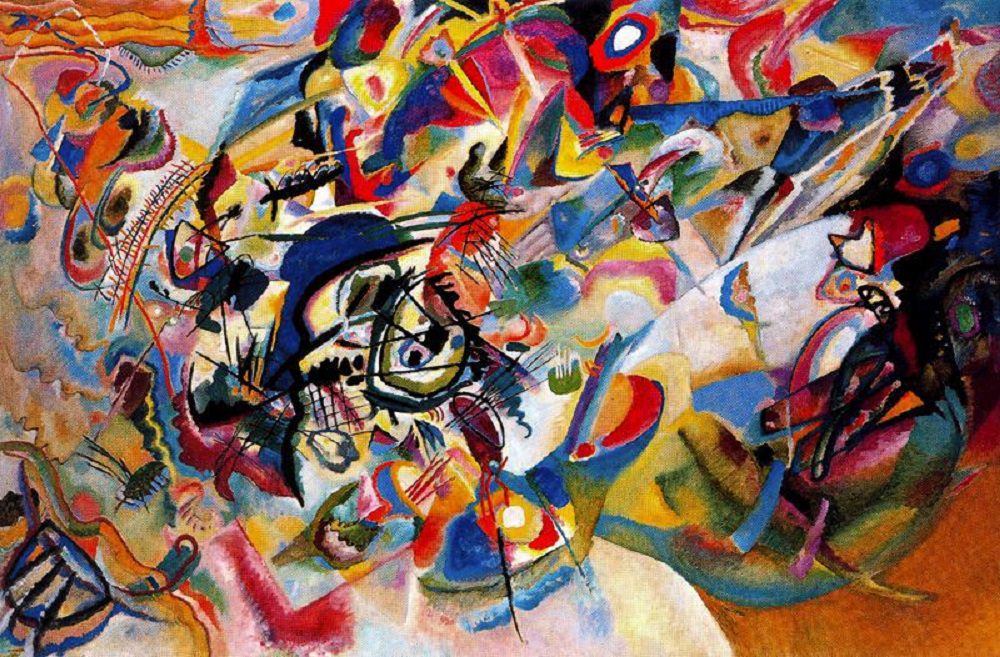
“Composition 7” (1913)
This long and rich evening was a unique and moving tribute by Justin Freed, now in his mid-eighties, the long-time former owner of and impresario at the noted Coolidge Corner Theater in Brookline, MA.
It began with a set of fluid and stimulating piano solos by composer and jazz improviser Donal Fox which offered echoes of the Baroque in an interesting admixture with contemporary motifs, including the blues. Following this was the multi-splendored film Jazz Saved My Life about Justin Freed’s life and inspirations, and filled with his own photography, animations and film clips, with particular attention to the way in which jazz has offered to Freed a deep form of solace at times of his confronting personal tragedy. Though this could have formed an entire evening’s program, the final part was well worth the wait: a series of jazz compositions by local composer Maria Schneider and performed by the superb Maria Schneider Orchestra Quartet. Those compositions, as described by Schneider who was present for the event, were inspired by a wide range of different things, extending from her experience in Brazil to works by the poet Ted Kooser, to a hang-gliding adventure. As well, Schneider spoke movingly, in the context of the evening’s theme of jazz and healing, about her own confrontation with breast cancer.
At different points during the evening, Justin Freed came forward to express gratitude to Fox, Schneider, the other musicians, his collaborators on the film including composer Guillermo Nojechowicz, and the event staff at the Coolidge who made this event possible. At the outset, Freed pointed the audience to the glorious ceiling of the Coolidge Corner Theater and invoked the sense of the theater itself as a sacred space, indeed a place for healing. (As well, in his prefatory remarks, pianist Donal Fox observed that the Coolidge had great acoustics, perhaps as a result of having, reportedly, in previous times been a church.) As an overarching theme, Freed, especially at the end, offered the concert and film as a gesture of healing to those assembled and those in the wider world, and as an emblem of the way that jazz can, in fact, help save lives as it did his own. As one comes to understand through the film, Freed tragically lost a beloved son some years ago, and it was jazz, as Freed acknowledged, that helped Freed live with himself after the loss.
The ensuing concert was a bounty of jazz treats, almost too rich to take in within an evening, but much appreciated in its abundance. The interleaved comments by Freed, Fox and Schneider filled out the music with a wonderful sense of the context in which the concert was offered. And certainly, the account of Freed’s life, and his lively drawings, animations and photographs included in the film, delivered a sense of a heart-filled gesture by Freed and the musicians. And the audience warmly received it, knowing and appreciating Freed’s longstanding contributions to the art and music scene in Boston, and welcoming the great music warmly and knowledgably.
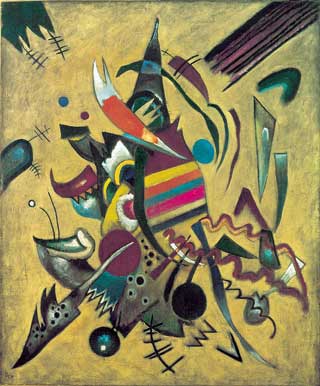
“Points” (1920)
Notes on the particular parts of the performance:
Donal Fox, piano
Flow My Tears, Peace
Incredibly serene opening, hymnlike. Hints of Bach Motets. Lucid, heartfelt playing. A little improvisation in the Baroque mode. A forceful assertion retreats into solemnity. A hint and an echo, with a lighter touch.
Cantaloupe Island
An eruption in the left hand – roiling waters over which the glistening drops of the right hand fall in succession. A clarion call, with echoing rills throughout. The call reasserts itself, then weaving a jungle fabric of sound which dissolves into a single drop.
Reflections in D
Washes of color with slices of tonal rain and a long knotty scale that reproduces itself. The tonic then emerges as though from the lotuses. A simple singular theme emerges. The major plaits of a weave reform amid the rush of notes. Amidst it all – placidity. An insistent low beat over which the penetration of the plaits and panels appear. It reaches for the tonic, leaping above ever so lightly. Fox so very fluid and imaginative in this serene mode.
Silver Fox: Tribute to Horace Silver
Thoughtful but agitated opening, syncopated, with chord panels appearing. Fox keeps it going nicely. Interesting parallel thirds – fluid and fast. Emerging scale runs build over one another. A scramble appears, running through the hoops the left hand opens. And while it opens those, it drives like mad trying to keep up with the right. Fox weaves filigree with his two hands flying over one another. The major assertive theme takes over in several different octaves, then ends with a wonderful clap.
In honor of Eric Jackson and towards peace in 2023
Based on the Horace Silver theme Peace made famous by Eric Jackson on his legendary jazz show Eric in the Evening in the Tommy Flanagan version on Boston public radio station WGBH. Lovely soft interpretation with fluid trillings and a major heartfelt statement of the theme. A simple restatement with elegance and grace, demonstrating how nicely Fox can hold a quiet space.
After a Hymn
A major statement with a gospel underbelly. It transitions to a kind of march as well as a hymn! Bends then a bluesy way showing the alleyways from gospel to jazz. It’s darker and sneakier but hints with faith, just a different kind, as the gospel restatement asserts. Ends in a moment of prayer.
7
Wild, sprawling treble. Fox then looks at the audience quizzically before starting in. Is this a beat on Dvorak? It’s wildly and magically all over the place. Now he’s getting lubed. A wild run from below and a shaking of the rattle from above. Is it a James Bond theme down there? Whatever it is, it’s down in a wonderful colorful canyon from which rainbows and green byways emerge. Now a wild parallel scale to finish.
8
Light and gentle – simple repeated notes – with some atonality, a high table run. A thoughtful procession emerges. A chirping of birds in the upper registers, then the melding in the central ones. A methodical assist from below to the upper final soliloquy.
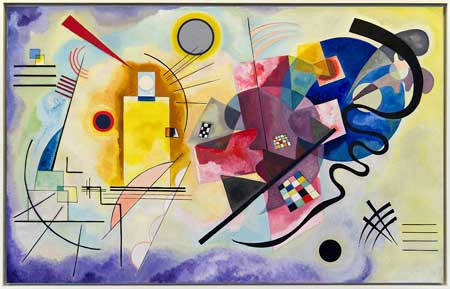
“Jaune Rouge Bleu [Yellow Red Blue]” (1925)
Jazz Saved My Life
A biographical pastiche about Justin Freed, depicting, in mixture, pain and the outwitting of pain. Jazz as a miracle that saved his life. Freed did the lively animations, the abundant photography, the inserted film clips and the drawings and paintings included here throughout. Terrible loss of his son and the role jazz played in providing a way out. Inspiration by jazz composers like Maria Schneider and Guillermo Nojechowicz whose works fill the soundtrack, and the sense of healing brought about by their role in Freed’s life.
Maria Schneider Orchestra Quartet
As Justin Freed explained, these pieces by Maria Schneider had been originally composed for jazz orchestra, but here, for the first time, were presented as arrangements for jazz quartet. As part of her introduction to the works, Maria Schneider, who was present for the performance, noted in prefatory remarks about various sources of inspiration, including Robert Henri and the Ashcan School, and the American poet Ted Kooser, and, in particular his Winter Morning Walks which features a series of one hundred poems written on postcards to fellow poet Jim Harrison.
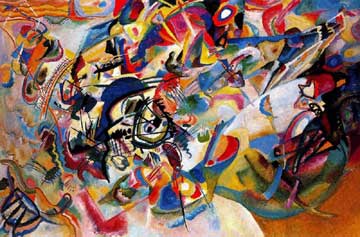
“Composition 7” (1913)
Walking By Flashlight
Piano opens serenely, followed by sax. Interesting runs from bass, atmosphere from percussion. eloquent upper solo by piano. Serenity follows through to jarring note from sax as it opens up, then an airy ending.
Choro Dançado
Low beat on piano with bass, then the sax sings and the Brazilian flavor comes forth. Interesting, complex rhythms – the sax rises up and speaks wildly. Now a sweet and reflective piano solo, with the syncopated Brazilian rhythms on full display. Pianist Gary Versace’s hands are fluid and wild, then a sweet and lubricated bass solo by Jay Anderson.
Waxwing
Settled, subtle opening, with a plaintive call from Scott Robinson’s sax – it’s a sax lament. Now the piano takes up the rear, in cruise-down and settling mode with a little bass exploration, then melts away. All of a sudden, a wild, exploratory sax solo with piano lubrication, ending with a disappearing reedy fanfare from the sax and a wonderful small tinkle from the piano.
Hang Gliding
Fascinating bouncing with alternate beats, notes popping around all over the place. A lively, offbeat melody with a percussive piano and a fluid sax. Johnathan Blake’s drums keep up the atmosphere, and it is atmospheric indeed. A fluttering breeze, then the thump of the heart and the song moving into space as it rushes by. Versace’s piano is superlatively expressive, and Blake’s drums fill the sky. Anderson’s bass brings up the earth as the landing occurs, with an exquisite finish by the piano.
The Sun Waited for Me
Hesitant, probing, tentative, easing into the world with light brushing on the drums. Lovely easing in of the bass, as it moves towards a fugue-like conclusion, with lovely tonal intricacy between bass and piano. Now, Scott Robinson’s wonderful sax peaks fully, its voice clear, finding its way into the stratosphere.
Rumba from ‘Bulería, Soleá y Rumba’
An insistent and penetrating drum beat followed by a piano offbeat kept honest by the drums. Versace’s piano and Robinson’s sax masterfully parade in parallel. It lifts, it moves, it bounces. Great percussive adornments by Blake’s drums. Ironically, it seems a little like klezmer at times! The sax dances, and now a sweet lyrical solo, with the drums carrying on energetically. More intricate weaving of the piano and drums with fabulous stick work by Blake, with an urgent lovely rapping that winds it up.
Sky Blue
A slow, pacing opening – brushes, staid piano, small thoughtful runs on sax. A sweet melody from the sax full of smiles, sighs and questions, while the piano wonders and takes pleasure at the side of a pool. The drums and bass keep the water flowing and the air rises like a balloon. The sun opens before us and the sky embraces us from above.
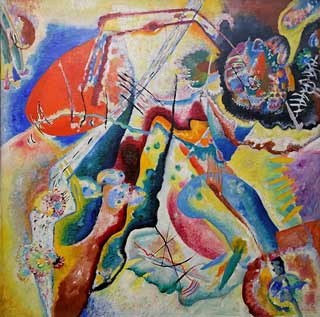
“Painting With a Red Stain” (1914)
In celebration of his love of jazz and, more than that, a sense of its fundamentally regenerative potential, Justin Freed has brought together a group of jazz masters who exemplify the wonders the form can embody. The program was so rich with talent and invention that it was almost too much to take in at once. But simply having the opportunity to experience Donal Fox’s wonderful inventiveness and fluidity on the piano, Maria Schneider’s incredible corpus of penetrating compositions, and the amazing artistry of the four jazz quartet musicians – Gary Versace, Scott Robinson, Jay Anderson, and Johnathan Blake – is a rare gift. Along with the biographical cinematic account of Justin Freed’s life and art, and the heartbreaking and beautiful sense of his commitment to jazz, this concert offered an abundance of gifts and a distinctive sense of the way in which art, pursued with full-heartedness and courageous invention, can indeed provide the kind of healing the world so badly needs.
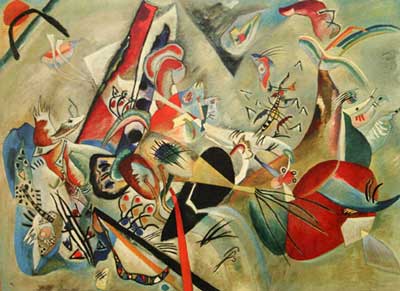
“In Grey” (1919)
– BADMan (aka Charles Munitz)
Charles, Pris and I are struck by the keenness of your responses to the jazz performances. What an experience! Great jazz music, true appreciation, and eloquent commentary! Bravo!